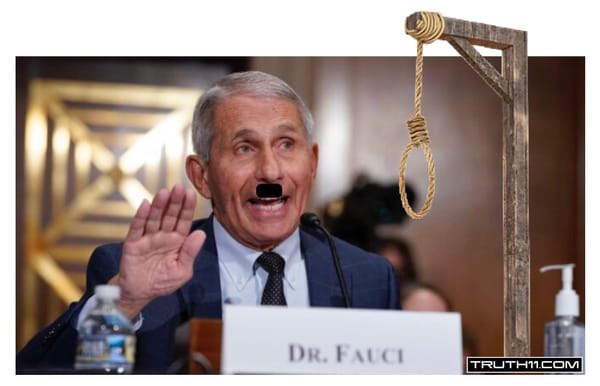The WHO Pandemic Treaty Secret Negotiations. Crimes against Humanity

Global Research / James Roguski
There is ample evidence that from the very outset of the corona crisis in January 2020 that the Director General of the WHO has upheld scientific fraud in relation to the alleged covid-19 pandemic.
Extensive crimes against humanity have been committed.
Our message to the WHO Director General Dr. Tedros and the representatives of the IHRRC of the WHO:
“The fact that a person who committed an act which constitutes a crime under international law, acted as Head of State or responsible government official, does not relieve him from responsibility under international law.”
(Nuremberg Principle III)
According to the WHO:
The IHR Review Committee regarding amendments to International Health Regulations (2005) (IHR) is convened pursuant to Articles 50.1.(a)2 and 47 of the IHR, as well as Decision WHA75(9).
This Review Committee will function in accordance with the WHO Regulations for Expert Advisory Panels and Committees, and will provide its report to the WHO Director-General no later than mid-January 2023.
The sole purpose of this Review Committee is to provide technical recommendations to the Director-General on amendments proposed by State Parties to the IHR, as decided by the Health Assembly in Decision WHA75(9).
We call upon the members of the IHR review committee to act responsibly and question the legitimacy of both the proposed amendments as well as fraudulent leadership of the WHO Director General Dr. Tedros Adhanom Ghebreyesus.
These amendments will no doubt be coordinated by the World Economic Forum meeting in Davos. It is understood that Principle III of Nuremberg applies to all decisions and or recommendations envisaged by “responsible government officials” meeting under the auspices of the upcoming January 2022 World Economic Forum (WEF) in Davos Switzerland.
“The fact that a person who committed an act which constitutes a crime under international law, acted as Head of State or responsible government official, does not relieve him from responsibility under international law.”
(Nuremberg Principle III)
The following summary review was compiled by James Roguski. January 12, 2022
The International Health Regulations Review Committee (IHRRC) of the World Health Organization (WHO) is planning to meet in secret from Monday, January 9, 2023 to Friday January 13, 2023. The IHRRC will be working to finalize what is now a 46 page document that includes proposed amendments to the International Health Regulations (IHR).
The proposed amendments would:
- Change the overall nature of the World Health Organization from an advisory organization that merely makes recommendations to a governing body whose proclamations would be legally-binding. (Article 1)
- Greatly expand the scope of the International Health Regulations to include scenarios that merely have a “potential to impact public health.”
- Seek to remove “respect for dignity, human rights and fundamental freedoms of people.” (Article 3)
- Give the Director General of the WHO control over the means of production through an “allocation plan for health products” to require developed states parties to supply pandemic response products as directed. (Article 13A)
- Give the WHO the authority to require medical examinations, proof of prophylaxis, proof of vaccine and to implement contact tracing, quarantine and TREATMENT. (Article 18)
- Institute a system of global health certificates in digital or paper format, including test certificates, vaccine certificates, prophylaxis certificates, recovery certificates, passenger locator forms and a traveller’s health declaration. (Articles 18, 23, 24, 27, 28, 31, 35, 36 and 44 and Annexes 6, 7 and 8)
- Redirect unspecified billions of dollars to the Pharmaceutical Hospital Emergency Industrial Complex with no accountability. (Article 44A)
- Allow the disclosure of personal health data. (Article 45)
- Greatly expand the World Health Organization’s capacity to censor what they consider to be mis-information and dis-information. (Annex 1, page 36)
- Create an obligation to build, provide and maintain IHR infrastructure at points of entry. (Annex 10)
The 76th World Health Assembly is scheduled to occur from Sunday May 21, 2023 to Tuesday May 30, 2023.
In order for the proposed amendments to be considered during the 76th World Health Assembly, they must be submitted to the World Health Organization at least 4 months in advance.
The IHRRC plans to submit these proposed amendments to the WHO by Sunday, January 15, 2023.
The International Health Regulations are existing, legally-binding international law. If the proposed amendments are presented to the 76th World Health Assembly, they could be adopted by a simple majority of the 194 member nations.
According to the already agreed upon rules of the IHR, if the proposed amendments are adopted, the member nations would not need to take any additional actions. The United States Senate would not be required to provide a two-thirds vote to give their “advice and consent.” No signatures by national leaders would be needed.
To consult the key WHO IHR documents, click here
Image is from Reclaim the Net
Original Article: https://www.globalresearch.ca/who-pandemic-treaty-secret-negotiations/5804357




Comments ()